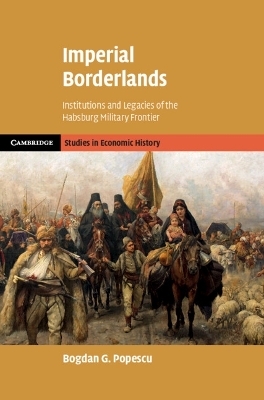
Imperial Borderlands
Institutions and Legacies of the Habsburg Military Frontier
Seiten
2023
Cambridge University Press (Verlag)
978-1-009-36516-1 (ISBN)
Cambridge University Press (Verlag)
978-1-009-36516-1 (ISBN)
What are the institutions which govern border spaces and how do they impact long-term economic development? The book focuses on the Habsburg frontier and provides a new framework for understanding how states force borderland dwellers to help accomplish the state's objectives and the long-term repercussions for access to public goods.
What are the institutions which govern border spaces and how do they impact long-term economic and social development? This book focuses on the Habsburg military frontier zone which originated in the sixteenth century as an instrument for protecting the empire's southern border against the threat of the Ottoman Empire and which lasted until the 1880s. The book outlines the conditions under which this extractive institution affected development, showing how locals were forced to work as soldiers and exposed to rigid communal property rights, an inflexible labor market, and discrimination when it came to the provision of public infrastructure. While the formal institutions set up during the military colony disappeared, their legacy can be traced in political attitudes and social norms even today with the violence and abuses exercised by the imperial government transformed into distrust in public authorities, limited political involvement, and low social capital.
What are the institutions which govern border spaces and how do they impact long-term economic and social development? This book focuses on the Habsburg military frontier zone which originated in the sixteenth century as an instrument for protecting the empire's southern border against the threat of the Ottoman Empire and which lasted until the 1880s. The book outlines the conditions under which this extractive institution affected development, showing how locals were forced to work as soldiers and exposed to rigid communal property rights, an inflexible labor market, and discrimination when it came to the provision of public infrastructure. While the formal institutions set up during the military colony disappeared, their legacy can be traced in political attitudes and social norms even today with the violence and abuses exercised by the imperial government transformed into distrust in public authorities, limited political involvement, and low social capital.
Dr Bogdan G. Popescu is an Assistant Professor at John Cabot University, Rome, Italy. He completed his Ph.D. in the Department of Political Science at the University of Chicago, held postdoctoral positions at Princeton and Bocconi University, and taught at the University of Oxford.
1. Historical States, Imperialism, and Development; 2. Imperialism and Extractive Institutions: A Theoretical Framework; 3. The Habsburg Military Frontier; 4. Military Colonialism and Economic Development; 5. Colonial Institutions and Social Norms; 6. Lasting Legacies: Political Attitudes and Social Capital; 7. Beyond the Habsburgs; 8. Epilogue.
| Erscheinungsdatum | 13.12.2022 |
|---|---|
| Reihe/Serie | Cambridge Studies in Economic History - Second Series |
| Zusatzinfo | Worked examples or Exercises |
| Verlagsort | Cambridge |
| Sprache | englisch |
| Gewicht | 649 g |
| Themenwelt | Geschichte ► Teilgebiete der Geschichte ► Wirtschaftsgeschichte |
| ISBN-10 | 1-009-36516-9 / 1009365169 |
| ISBN-13 | 978-1-009-36516-1 / 9781009365161 |
| Zustand | Neuware |
| Informationen gemäß Produktsicherheitsverordnung (GPSR) | |
| Haben Sie eine Frage zum Produkt? |
Mehr entdecken
aus dem Bereich
aus dem Bereich
Macht und Herrschaft im Zarenreich
Buch | Hardcover (2024)
C.H.Beck (Verlag)
CHF 69,85


